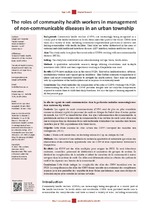The roles of community health workers in management of non-communicable diseases in an urban township
Date
2014Author
Tsolekile, Lungiswa
Puoane, Thandi
Schneider, Helen
Levitt, Naomi S.
Steyn, Krisela
Metadata
Show full item recordAbstract
BACKGROUND: Community health workers (CHWs) are increasingly being recognised as a crucial part of the health workforce in South Africa and other parts of the world. CHWs have taken on a variety of roles, including community empowerment, provision of services and linking communities with health facilities. Their roles are better understood in the areas of maternal and child health and infectious diseases (HIV infection, malaria and tuberculosis). AIM: This study seeks to explore the current roles of CHWs working with non-communicable diseases (NCDs). Setting: The study was conducted in an urban township in Cape Town, South Africa. Method: A qualitative naturalistic research design utilising observations and in-depth interviews with CHWs and their supervisors working in Khayelitsha was used. Results: CHWs have multiple roles in the care of NCDs. They act as health educators, advisors, rehabilitation workers and support group facilitators. They further screen for complications of illness and assist community members to navigate the health system. These roles are shaped both by expectations of the health system and in response to community needs. CONCLUSION: This study indicates the complexities of the roles of CHWs working with NCDs. Understanding the actual roles of CHWs provides insights into not only the competencies required to enable them to fulfil their daily functions, but also the type of training required to fill the present gaps. Introduction Community health workers (CHWs) are increasingly being recognised as a crucial part of the health workforce.1 In South Africa and worldwide, CHWs have provided health care to communities for many decades and have assumed a variety of roles, including community

